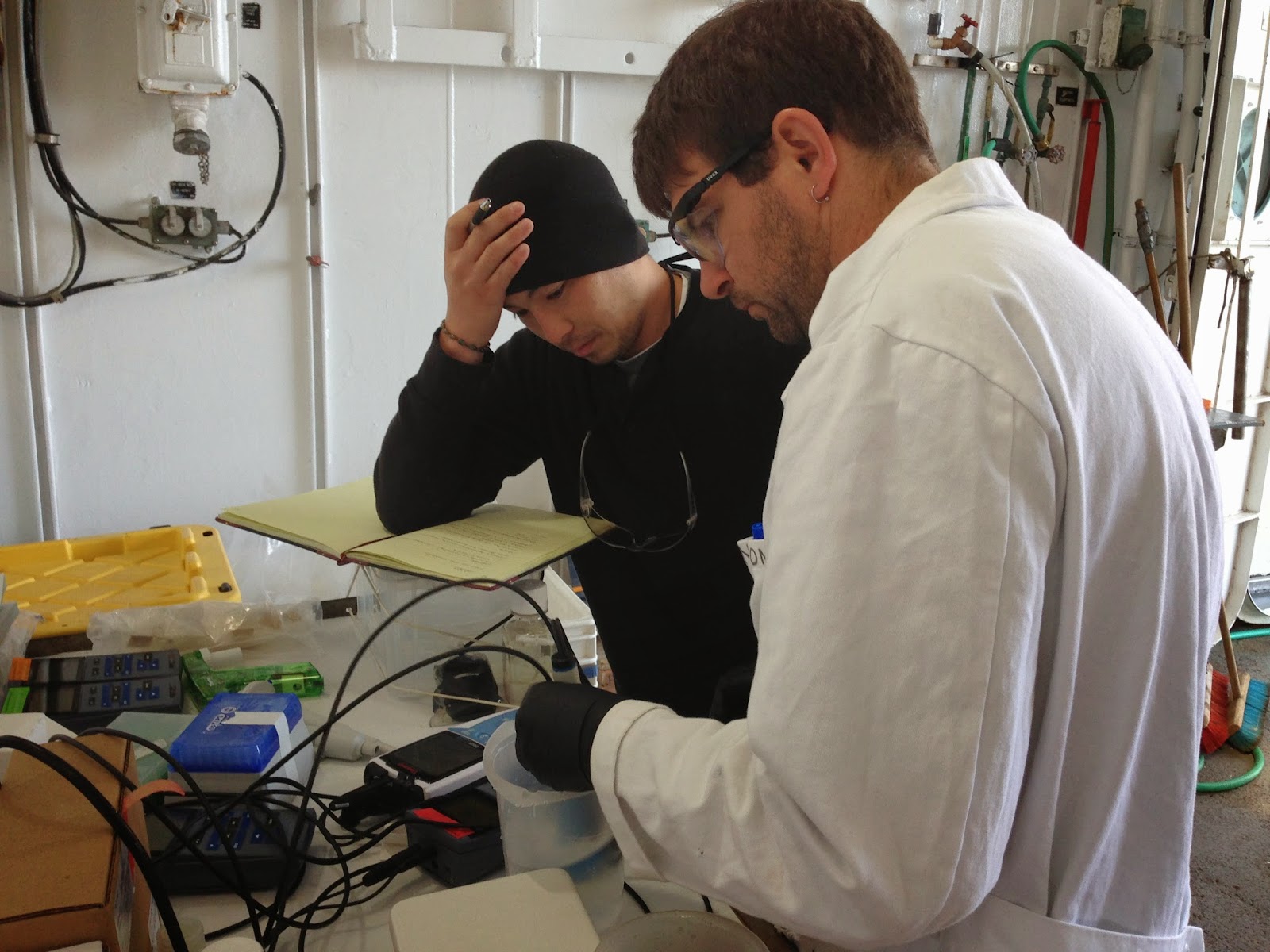 |
| If you want to keep your fingers... |
The sun rose to shine on our rolling ship. It was difficult getting dressed in the morning while the vessel was rocked by waves. We have been reminded to take extreme caution. Whether it's walking on deck, opening a door, carrying chemicals, it's a battle with keeping one's balance.
After breakfast, we carried out our routine CTD cast. This one was a little more challenging than previous casts because of the ship's movement. We had plenty of hands on deck to make sure that we safely deployed the equipment.
 |
| Heather Richard and Maribel Albarran of RTC-SFSU, are preparing solutions for a plastic pollution experiment. |
 |
| Heather Richard (RTC-SFSU) is seen here arranging her experimental bottles inside of an incubator. |
 |
| A view of the incubators on deck. The large metallic incubator is called the "Terminator." |
Shortly after dinner, we performed a GoFlo cast, using a bottle lowered to a desired depth, and collected water for trace metal analysis. Since metal from the ship could contaminate the sample, special care is taken to secure a clean sample. The bottle remains closed when it is sent down the line and is only opened when it is triggered by a messenger weight. I was able to assist Dr. Wells with the recovery of this device.
 |
| Dr. Trick with Julia Matheson and Andrew Shellenbah (Western Univ.) are viewing various types of phytoplankton, sorted by size. |
We were pleased to see that our light sensor is doing well and taking measurements. Andrew Shellenbach and I have spent the last three days setting up and checking to make sure that it is properly recording data. He downloaded today's data and all indications are that it is doing what it is supposed to do. In case of research involving phytoplankton, we need to know how much sunlight is involved.
As the evening comes to a close, Dr. Cochlan and I are discussing the plan for tomorrow. The samples that I have collected are high in biomass, which means that there's a lot of phytoplankton growth at this station. I will reduce the volume of samples taken as to avoid having to dilute our samples. Dilutions take a long time and are difficult to perform in the dark room. We will have a CTD cast at 0800 hrs, followed by data readings. I plan to do my chlorophyll work for about two hours. We will also get the leaking incubator up and running and check up on other ongoing experiments. We will stay near Lopez Point for a few more days before we sail north along the California coast.
As the evening comes to a close, Dr. Cochlan and I are discussing the plan for tomorrow. The samples that I have collected are high in biomass, which means that there's a lot of phytoplankton growth at this station. I will reduce the volume of samples taken as to avoid having to dilute our samples. Dilutions take a long time and are difficult to perform in the dark room. We will have a CTD cast at 0800 hrs, followed by data readings. I plan to do my chlorophyll work for about two hours. We will also get the leaking incubator up and running and check up on other ongoing experiments. We will stay near Lopez Point for a few more days before we sail north along the California coast.
We love to hear from you. If you have a comment or question, send them our way. Please continue to follow our adventures and feel free to share them with your students, friends and family.
Science is searching for answers.
Science is a process.
Science is a collaborative effort.
Science is fun!
 |
| Dr. Mark Wells (Univ. of Maine) and I are seen here removing the GoFlo bottle from the casting line. |
 |
| Deployment of the GoFlo bottle. |
 |
| Andrew Shellenbach (Western Univ.) is seen here downloading light measurements. |
 |
| Denis Costello (Cypress Lakes HS, Katy Texas) and Trey Joyner (Normal Park Museum Magnet, Chattanooga, TN). Your teachers at sea. |
Sending down the messenger weight.

Just wanted to say, Thank You so much for the blog! It is a morning routine now for us to check in and see how things are progressing! The pics are greatly appreciated!! We are far away, but the blog makes us feel closer! Thanks again and enjoy the trip. Lori.
ReplyDeleteThank you for following. We are all doing well here.
ReplyDeleteI will try to post with more pics. Glad to know that you are enjoying it.
~Denis